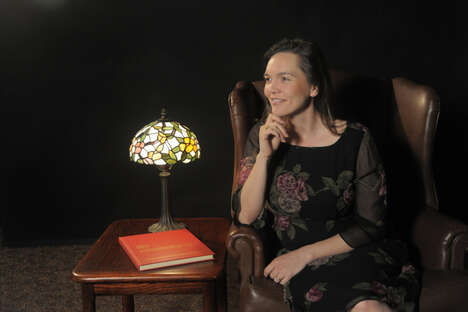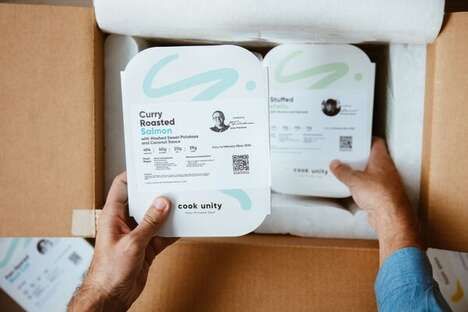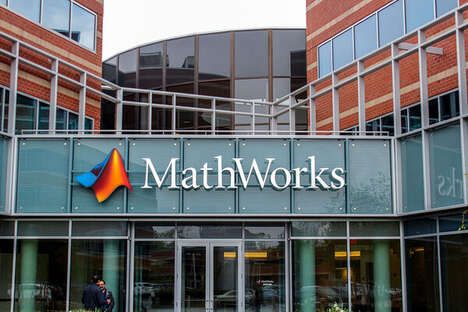Making Coincidences Happen
An Interview with Debbie Amato Deputy Chief Technologist at NASA's Goddard Space Flight Center
 With a mission to go to Mars in 20 to 30 years, NASA is known for its revolutionary advancements in aerospace engineering and tech. Debbie Amato, Deputy Chief Technologist at its Goddard Space Flight Center is at the forefront of these achievements and was recently interviewed on the Future Festival World Summit stage.
With a mission to go to Mars in 20 to 30 years, NASA is known for its revolutionary advancements in aerospace engineering and tech. Debbie Amato, Deputy Chief Technologist at its Goddard Space Flight Center is at the forefront of these achievements and was recently interviewed on the Future Festival World Summit stage. Trend Hunter's CEO Jeremy Gutche conducted the interview, gaining insight into her secrets for success within her sector and beyond.
1. Tell everyone a little bit more about what your job is?
My primary responsibility as Deputy Chief Technologist is managing the internal research and development program at Goddard and we develop the new technologies and new ideas for future missions. So all kinds of different things like optical coatings, sensors or algorithms, so it's really the seed corn for missions 20 to 30 years down the road.
2. Tell me all about how important collisions are and how you architect them?
I really believe that collisions are a real key factor in innovation, especially your random collisions where you run into somebody who can look at your activities from a new perspective, or a new teaming arrangement where you can work with someone that you never would have thought that you you'd have common interests with.
One of the ways that I facilitate collisions is that we sponsor an annual poster session for our internal research and development. We have folks from across the organization that come in, presenting their technical developments, and they could be standing next to someone they've never met before they could spark a conversation.
During that poster session, it’s important to give people a little bit more of the ingredients on what it takes. If I'm a scientist wanting to participate, what do I need to do to get my poster in and how does that work? So not only do we have the poster session at Goddard, but we have various other events like a science jamboree that's held annually and you could have your science poster there for the Iread program. You have to go through our proposal process and be selected, and then can present your accomplishments for the year while thinking about how many people you would bring to a given poster session. Annually, we have about 100 presenters but the whole Goddard community is invited to come to the poster session. There's a real mixing and cross fertilization, and one of the things that I love to do.
3. I had a chance to do workshops with Debbie and our teams, but what I loved was your example of a poster session where people got an idea and they're all excited and you're like, yeah I made that coincidence happen. I think it's kind of a neat idea to think of yourself as having some level of trying to make coincidences happen. So how do you explain your role in that?
When it comes to innovation, I think that there are some ways that we can encourage and enable innovation and enable these collisions to happen. For example with the poster session, we had a heliophysics scientist presenting his paper standing right next to the sun. We had a solar physicist standing next to an astrophysicist and they started a conversation and found out they had common interests. They developed an Iread proposal for developing X-ray optics that would be applicable to both of their science investigative areas. So yeah ideally, I want to push people together. I also see myself as a connector.
If somebody I come across has an idea but they don't know where to go, I put them in touch with the organization that could benefit from their idea, or vice versa.
4. I think there's something that you've said too, which might surprise many people here. But I think when you listen to an innovative NASA talk, it sounds intimidating because they're operating at this level. But I thought it was interesting to note that although you're throwing words around like heliophysics, you yourself are not a scientist. You're an incubator of ideas, as you've explained to me before.
Yes, exactly. My background is actually aerospace engineering, and my claim to fame. Well my claim to fame is having hardware that I've put together to orbit the Earth so that's pretty cool.
Throughout my career, I've definitely moved from hands-on engineering to more of a management position, and really, I'm a professional bureaucrat at this point. But for sure, incubating those ideas that are the winds of the future is important.
5. How did you get yourself into your role? How did you end up getting in there?
So this was actually a collision in my life. My husband and I were attending the space prom, which is this big “will you go to space prom with me” moment. It’s this big Goddard Memorial dinner that happens on an annual basis in Washington DC. It has aerospace industry and military folks in attendance, and while there, I bumped into a colleague of mine and he said, I don't know what I'm going to do. His deputy left and took a new job and he didn't know where he was going to find someone. And I said, I think I might know someone who'd be interested. And he said, “oh your husband,” and my husband works at NASA as well. He’s a very accomplished Aerospace Engineer, and I said, “no me.”
It turned out that I was able to get the job and to this day, my boss says that he never would have thought of me for the position but we really gelled together and it works well.
6. Here's a thing that I found sort of interesting. I want to get your advice for people who want to think about making an innovation culture in their office. What are your highest points of advice for all the different types of companies in the room?
The first thing that comes to mind is trust and I that it’s the essential foundation for innovation. If people don't have the freedom to experiment, the freedom to fail, and to learn from their failure, then you are going to be preventing innovation. I would say trust is number one and as we saw earlier, culture trumps strategy, so it really does come down to culture and having that encouraging, enabling and incubating culture for innovation.
7. You’re a really big ambassador for Women in Science. A lot of women in this room are very successful in their own companies, and some maybe are in a position to mentor others. Others are maybe looking for a mentor themselves. Tell me a little bit about your involvement in mentorship?
I think that we all have a responsibility to be a mentor. I have been a mentor through various different arrangements – either through formal mentorship programs or informally – and have actually been asked to be someone's mentor. I feel like that’s the highest compliment when someone asks if I’d be their mentor.
The thing is that I feel like I get so much more out of the mentorship relationship that I'm giving to the people that I'm mentoring. I think it’s really important, especially for newer employees in order to help them feel comfortable and help them to have a good experience within your organization. Having a good senior mentor is important and peer mentoring should happen organically as well.
8. Any other final words for the group?
I would just say keep having those collisions as we go through the next day or so. You never know when you meet someone where that spark of a relationship might lead. It might be the next big thing.
References: women.nasa.gov
Featured Articles

Membership Dining
Members-only dining establishments take on new business models

AR Package
Brands incorporate augmented reality-based gaming into product packaging

Social Collabs
TikTok is collaborating with other business in the creative industry

Mindful Entrepreneurship
Brands release programs that help users learn about and build businesses